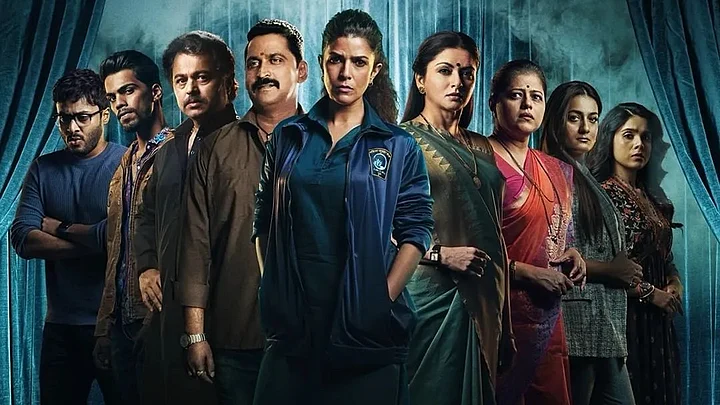The name Sajini Shinde Ka Viral Video alludes to a much more sinister concept than the film introduces and that is smart because it’s a great insight into how little it takes to turn public opinion against women. A teacher, Sajini Shinde (Radhika Madan), spends her birthday night at a party and a video of her dancing (and just having fun in general, as people do) goes viral.
When she returns to India, she is welcomed by hate and vitriol – scores of people resort to slutshaming her online and her principal (Bhagyashree) sacks her and her friends. The topic of ‘morality’ is brought up often and everyone uses it as a way to vilify both Sajini as a person and as a professional. Director Mikhil Musale gets the film’s setting and tone absolutely right.
Sajini hails from Pune – a city that is a melting pot of people from different generations and often from different ideologies. Sajini’s family is supposed to be a snapshot of this diversity. Oftentimes characters point out that the tech savvy, free-spirited Sajini sticks out like a sore thumb in her family, and she does. Her father Suryakant (Subodh Bhave) is a stage actor who performs seemingly progressive plays but returns home to hold up a suffocating patriarchal family structure.
His wife (Sneha Raikar) is silent for most of the film and often turns to her husband before she speaks. When Sajini leaves a suicide note on her Facebook wall and disappears, she is the first to show remorse, as the cop in-charge Bela (Nimrat Kaur) points out. The patriarch uses the uneven division of labour in his household as a threat for his daughter, goading her fiancé Siddhant (Soham Majumdar) to ‘make her work hard at home’.
Sajini Shinde Ka Viral Video exists in a world where social media is omnipresent but the messaging is more layered. It’s a film that focuses on the real and the staged. Sajini’s father is on a literal stage, spouting feminist dialogues he never intends to internalise.
Sajini’s controlling and abusive fiance fronts like the ‘nice guy in trouble’ often reiterating that he was a ‘good boyfriend, right?’ Sajini’s friend, not acknowledging any of her part in the matter, continues to start one social media campaign after another. Every character is less interested in Sajini’s disappearance and more in their personal interests and posturing.
It is a disheartening and raw insight into the real world.
The plot, written by Musale, Anu Singh Choudhary, Kshitij Patwardhan, and Parinda Joshi, treats these basic ideas well. The relationship Sajini shares with Siddhant isn’t one that is outwardly “violent” but it leaves you with a pit in your stomach because of how subtle the acts of abuse are. Siddhant’s friend and lawyer proclaims, “You’re an idiot and classist but you’re not a criminal,” but it’s refreshing that the film doesn’t give Siddhant that leeway.
At the same time, the film’s understanding of mental health and feminism are rather superficial in places. While it acknowledges the sexism Bela faces at the workplace and makes her rightfully angry at performative feminism, it never truly addresses the feminist subtext of the film itself. “What is feminism?” Bela asks a character in indignant rage but the answer is lost in a convoluted argument.
The film’s writing is perceptive, astute, and mostly sensitive but it isn’t as nuanced as one would hope. It feels like the film started out strong but for some reason began pulling its punches.
One of the film’s drawbacks is also its sound design. The background score does nothing to keep the plot tied together. A few scenes aside, the score stands out but not for its brilliance.
Nimrat Kaur, however, doesn’t hold back as Bela – every creative decision on her part works for the film. From the way her tone becomes more assertive or more inquisitive depending on the suspect she’s interrogating to her visible frustration at not being able to find a reliable lead, Kaur captures the essence of Bela. I was taken back to her work in the recent House of Lies (consider this a recommendation if you haven’t already watched it).
The rest of the cast too, especially Majumdar as the elitist (not a criminal) Siddhant, deliver convincing and effective performances. Some scenes seem unnecessarily drawn out and, for the lack of a better word, lackluster but that is in no part the cast’s fault. The way Radhika Madan plays Sajini is also worthy of mention – her dejection and grief are palpable.
Sajini Shinde Ka Viral Video is a brilliant film on paper but in execution, it leaves you wanting more. As a story, it has merit but as a thriller, it simply isn’t engaging enough. While the second half picks up, the resolution isn’t enough to make up for its flaws.
Does the film deserve credit for delving into the ideas that it does? Absolutely. But, like I said, it would’ve benefited from a deeper understanding of its own ideas and a leap of faith.
(At The Quint, we question everything. Play an active role in shaping our journalism by becoming a member today.)
